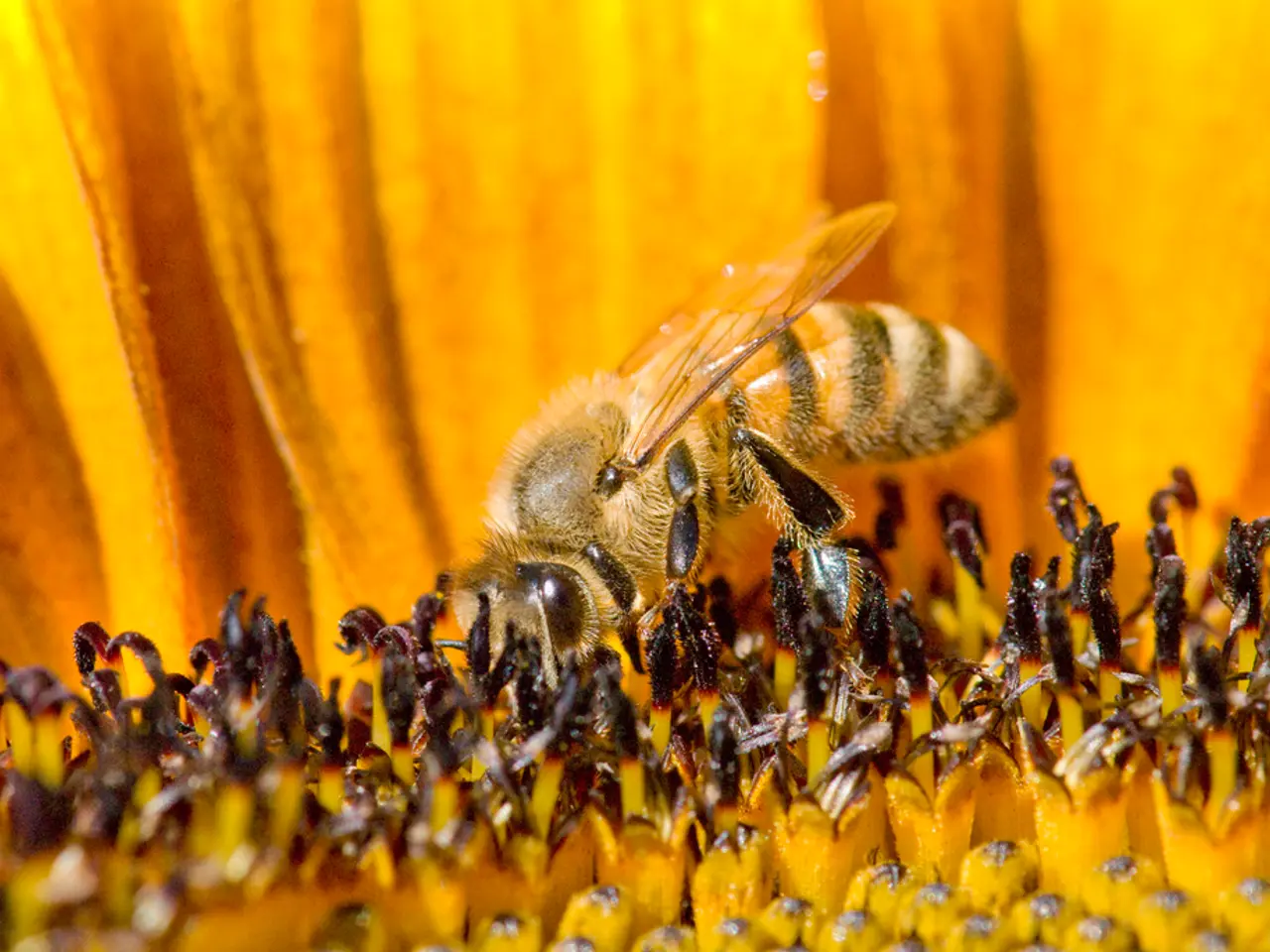Plant Wildflower Seed Blend Suitable for Pollinators This Coming Spring
In the quest to create a vibrant and thriving garden, many gardeners are turning to wildflower seed mixes that not only add a splash of colour but also serve as a vital food source for native pollinators. These mixes, designed with regional suitability in mind, offer a variety of nectar and pollen sources for bees, butterflies, and hummingbirds.
For those residing in the Midwest, the Pennington Wildflower Midwest Garden Mix is a popular choice. This mix, formulated specifically for the region, includes pollinator-friendly species such as Purple Coneflower, Pot Marigold (Calendula), and Baby's Breath. It attracts hummingbirds, butterflies, and bees, producing bright colours and rich textures suitable for meadows or borders. Best planted in early spring or late fall with full sun to partial shade exposure.
Another Midwest favourite is the Midwest High Diversity Native Seed Mix by Love Native Plants. This mix contains 50 native wildflower and grass species, including Butterfly Milkweed (*Asclepias tuberosa*), Blackeyed Susan (*Rudbeckia hirta*), and Golden Alexanders (*Zizia aurea*). This mix blooms from May to October and adapts to a range of moisture conditions, suitable for creating diverse prairie-like habitats.
The Pacific Northwest region can benefit from the PNW Native Wildflower Mix by Territorial Seed. This mix includes approximately 15 native and naturalized perennials and annuals such as Baby Blue Eyes (*Nemophila menziesii*), Bigleaf Lupine (*Lupinus polyphyllus*), California Poppy (*Eschscholzia californica*), and Clarkia species. It is tailored to the Pacific Northwest’s climate for supporting native pollinators.
In the Northeast, the Northeast High Diversity Native Seed Mix by Love Native Plants contains 45 species of native wildflowers and grasses, emphasizing high diversity. It includes species that thrive in the Northeast climate, supporting long bloom periods and varied habitats for butterflies, bees, and other pollinators.
For a more general purpose mix, the Pennington Wildflower Garden Mix is a suitable choice. This mix includes Crimson Clover, Baby's Breath, and Sulphur Cosmos, which attracts hummingbirds, butterflies, and bees. It can be planted in full sun to partial shade and is suitable for various regions.
When choosing a seed mix, consider your local climate, soil type, and sunlight exposure to maximize success and ecological benefit. Preparation involves removing existing vegetation and rocks, planting at the recommended time, and ensuring adequate watering and fertilization.
Helping local ecosystems remain healthy and allowing native pollinator populations to flourish is a significant benefit of planting wildflowers. Many annual wildflowers will grow throughout all USDA hardiness zones, while perennial plants will continue growing for years in their preferred zones.
Creating a pollinator habitat with easy-to-grow, low-maintenance wildflower species can bring more colour and life to the area. Some other mixes worth considering include the Eden Brothers Northeast Wildflower Seed Mix, the Outsidepride Southeast Wildflower Seed Mix, the NatureZ Edge Wildflower Seed Mix Pollinator Varieties, and the Eden Brothers Western Wildflower Seed Mix.
The importance of pollinators lies in their role in keeping local environments healthy and assisting in the production of food. A decrease or loss of pollinators would result in a lack of food choices and an increase in food prices. By adding a pollinator seed mix to your spring gardening chores, you can help feed native pollinators and keep your native environment healthy.
Honeybees, along with other bees, are the most important pollinators, contributing to the pollination of many common plants such as avocados, almonds, apples, various berries, and onions. The Zaad Honey Bee Wildflower Pollinator Mix is a premium mix of wildflower seeds designed to attract honeybees and other beneficial pollinators, and it's hardy growing in all USDA zones.
For those specifically interested in attracting monarch butterflies, the Monarch Butterfly Rescue Wildflower Seeds are designed to attract monarch butterflies and contain food for the larvae and a nectar source for adults. Each package covers 100 to 150 square feet and comes with complete instructions on planting and continued care.
Regardless of location, there are pollinator wildflower seed mixes available that are appropriate for attracting various beneficial insects and other pollinators. By choosing the best mix for your region, you can contribute to the health of your local ecosystem and enjoy the beauty of a blooming garden teeming with life.
- For individuals focusing on fashion-and-beauty, Calendula (a component in the Pennington Wildflower Midwest Garden Mix) is not just a wildflower species, but also a popular skincare ingredient known for its healing properties.
- In the realm of education-and-self-development, understanding gardening techniques, like timing your planting for the best results, can be a rewarding learning experience, especially when it comes to nurturing wildflowers.
- Fans of sports might find it interesting that some professional sports teams, such as the Milwaukee Brewers, have dedicated sections of their stadiums to local wildflowers, creating unique pollinator habitats.
- While traveling across the country, one can appreciate the diverse landscapes and native wildflowers, like Bigleaf Lupine (found in the PNW Native Wildflower Mix), that contribute to the beauty and identity of various regions.
- By opting for a car with a sunroof, you can enjoy the sight and smell of blooming wildflowers during your daily commute, actively participating in the enjoyment of these beautiful plants.
- Shopping enthusiasts can support local businesses selling native wildflower seeds, helping to ensure a diverse range of pollinator-friendly plants and contributing to the health of local ecosystems.





